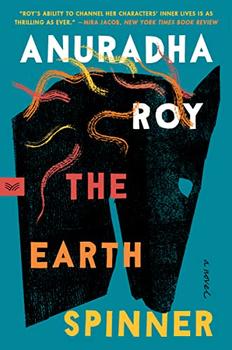Summary | Excerpt | Reading Guide | Reviews | Beyond the book | Read-Alikes | Genres & Themes | Author Bio

A novel
by Sunjeev SahotaThe four primary characters — Tarlochan, Avtar, Randeep, and the sole woman, Narinder — at the heart of this deeply affecting novel are stuck. They are mired in a morass shaped by circumstances beyond their control: birth, caste, and family ties. They each feel the "grand impossibility of recasting" their lives and Sunjeev Sahota's Booker-shortlisted story is proof that reinvention is a luxury most can't afford.
Yet, a new life is exactly what the three men, who are from India, must seek if they want to harbor any hope of feeding themselves and their families. It is ironic that the "year" in the novel's title is 2003, a time when India's economy was scorching hot, the country's GDP grew an impressive 8.2% between 2003-2004. Yet even in this seemingly robust climate, the wheels of progress were not churning uniformly for everyone, a point hammered home subtly and brilliantly by the characters' backstories.
Avtar and Randeep's lower-middle class families have complicated interconnected histories, and Sahota takes his time in laying out the case for why illegal migration to the UK feels like the only way out for these young men. Tarlochan (Tochi as he is often referred to) is additionally burdened by his caste — he is a "chamaar," occupying the lowest rung on India's complicated societal status totem pole, an accident of birth that becomes even more troublesome when right-wing fundamentalism rears its ugly head in a country that often brags about being a shining example of tolerance. In the climate of 2003, aspersions are cast on everybody who is "impure."
Somehow cobbling together "fees" for a smuggler, the three make their way to Sheffield in the UK where they live in precarious conditions with nine other such economic migrants, competing for scarce, extremely low-paying jobs. Narinder, the sole British native, has a story whose arc might be different from the rest — she is not as motivated by economic concerns for one thing — but ends up being one of the most compelling. Narinder is Randeep's "visa wife," a role she feels propelled to take on as a fulfillment of her religious duties, morally obligated to help a fellow Sikh, any Sikh, who is in need of a leg up in life.
The novel starts off a tad clunky, too constrained by its narrative technique, weaving between past and present. Sahota lingers longer than feels necessary on the characters' backstories, a little overly fascinated by the scenery. The momentum picks up in the latter two-thirds of the novel, when the four characters' lives weave together in compulsively readable ways. Sahota effectively employs dramatic irony, where the reader is privy to both the whole canvas and smaller details of the characters' lives, which are eloquently painted so we can see the train wrecks coming before they actually do.
Great fiction often successfully sheds light on the human condition, and by this metric Runaways definitely scores. The novel might be saturated with many moments of utter misery and deprivation, but its darkness is readily understandable and feels utterly and horrifyingly realistic. Immigrant narratives are often consumed with the idea of belonging, but as Runaways eloquently shows, extreme poverty has a way of overriding such higher-level concerns, making them feel decadent. This is a world of louts, of smugglers, of desperate migrants whose morals are continually challenged as they face starvation and worse, but it is also one where humanity, in all its positive avatars, offers small but necessary rays of hope.
The New York Times columnist, Thomas Friedman, has famously argued that the world is getting increasingly flat, that globalization means as much opportunity in Madrid as in Mumbai as in Manhattan. Runaways makes a brilliant counter-argument. Sahota, one of Granta's Best Young British Novelists, shows that a rising tide, when present, doesn't lift all boats equally. It leaves millions stranded, seeking safe harbor and risking life and limb just to stay afloat.
Additional Information
In 2013, a French movie, Bebe le Tigre, won critical acclaim for a story that centered on a Sikh teenager, an economic migrant making do in the ghettos of Paris — a different place, a different time, but a story that bears much in common with Sahota's moving novel. The movie, whose trailer is below, is worth watching.
![]() This review was originally published in The BookBrowse Review in April 2016, and has been updated for the
March 2017 edition.
Click here to go to this issue.
This review was originally published in The BookBrowse Review in April 2016, and has been updated for the
March 2017 edition.
Click here to go to this issue.

If you liked The Year of the Runaways, try these:

by Anuradha Roy
Published 2023
From the critically acclaimed, Booker Prize-nominated author of Sleeping on Jupiter and All the Lives We Never Lived, an incisive and moving novel about the struggle for creative achievement in a world consumed by growing fanaticism and political upheaval.

by Neel Mukherjee
Published 2019
What happens when one attempts to exchange the life one is given for something better? Can we transform the possibilities we are born into?
Your guide toexceptional books
BookBrowse seeks out and recommends the best in contemporary fiction and nonfiction—books that not only engage and entertain but also deepen our understanding of ourselves and the world around us.